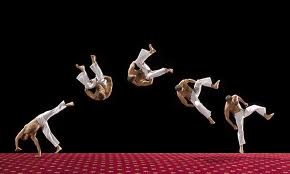记忆方法
为了记忆单词“acrobat”,可以将其分解为两个部分:“ac”和“robat”。首先,想象“ac”代表“ace”,意味着非常出色或高手。然后,“robat”可以想象成“rope”加上“bat”,就像杂技演员在绳索或杆子上表演,就像一个灵活的“bat”在绳子上飞舞。通过这样的联想,可以帮助记住“acrobat”是杂技演员的意思。
以上内容由AI生成, 仅供参考和借鉴
中文词源
acrobat 杂技演员
来自词根acer, 尖的,高的。-bat, 走,同vent,走,见advent,来临。-t,过去分词格。指走高空钢丝的杂技演员,后统指杂技演员。
英语词源
- acrobat
-
acrobat: [19] The Greek adjective ákros meant ‘topmost, at the tip or extremity’ (it derives ultimately from the Indo-European base *akmeaning ‘be pointed or sharp’, which also gave rise to acid, acute, oxygen, and edge). It crops up in acrophobia ‘fear of heights’; in acropolis ‘citadel’, literally ‘upper city’; in acromegaly ‘unnaturally enlarged condition of the hands, feet, and face’, literally ‘large extremities’; and in acronym, literally ‘word formed from the tips of words’. Acrobat itself means literally ‘walking on tiptoe’.
The -bat morpheme comes from Greek baínein ‘walk’, which is closely related to basis and base, and is also connected with come. Akrobátēs existed as a term in Greek, and reached English via French acrobate.
=> acid, acute, edge, oxygen - acrobat (n.)
- 1825, from French acrobate (14c.), "tightrope-walker," and directly from Greek akrobates "rope dancer, gymnastic performer," which is related to akrobatos "going on tip-toe, climbing up high," from akros "topmost, at the point end" (see acrid) + stem of bainein "walk, go" (see come).
权威例句
- 1. The acrobat balanced a long pole on his left shoulder.
- 杂技演员让一根长杆在他的左肩上保持平衡.
- 2. The acrobat could bend himself into a hoop.
- 这个杂技演员可以把身体蜷曲成圆形.
- 3. An acrobat has to be agile.
- 杂技演员必须身手敏捷.
- 4. The acrobat bounced high from the ground.
- 那个杂技演员从地面上一下子弹跳得老高.
- 5. The acrobat's feat took the audience's breath away.
- 杂技演员的惊险动作使观众为之咋舌.
